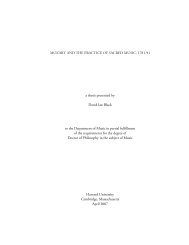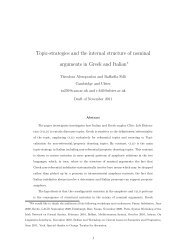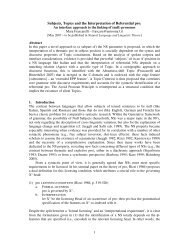You're like `why not?' The quotative expressions of Glasgow ...
You're like `why not?' The quotative expressions of Glasgow ...
You're like `why not?' The quotative expressions of Glasgow ...
You also want an ePaper? Increase the reach of your titles
YUMPU automatically turns print PDFs into web optimized ePapers that Google loves.
QUOTATIVES IN GLASGOW 15<br />
Imperatives<br />
Answers<br />
remarks but have a pragmatic and rhetorical force. Golato, in an article dealing<br />
with the new German <strong>quotative</strong> und ich so/und er so `and I'm <strong>like</strong>/and he's<br />
<strong>like</strong>'), claims that this type <strong>of</strong> <strong>quotative</strong> `is sensitive to the context in which it is<br />
uttered' 2000: 32). <strong>The</strong> same would appear to be the case with non-traditional<br />
<strong>quotative</strong>s in <strong>Glasgow</strong>.<br />
4. DISCUSSION<br />
Given the recent history <strong>of</strong> <strong>quotative</strong>s in the U.S., it is <strong>like</strong>ly that the use <strong>of</strong> be <strong>like</strong><br />
and be as <strong>quotative</strong>s is a relatively new phenomenon in the speech <strong>of</strong><br />
Glaswegians. 6 <strong>The</strong> ®gures from the present sessions are too slight to provide<br />
®rm evidence <strong>of</strong> how these forms entered the community, though there is a<br />
possibility suggested by the adult data and the occurrence <strong>of</strong> mixed forms with<br />
<strong>like</strong> that the variety <strong>of</strong> forms re¯ects the historical development <strong>of</strong> the <strong>quotative</strong>s<br />
in <strong>Glasgow</strong>. This would give the following scenario:<br />
Stage one: <strong>The</strong> <strong>quotative</strong> go imported from the U.S.?) is adopted by adolescents<br />
for the expression <strong>of</strong> non-speech sounds the thing that goes `Dong') and strong<br />
emotion and I'm going `Oh no'), later extended to all kinds <strong>of</strong> quoted speech She<br />
went `I would think so'). It later spreads to adult speech.<br />
Distributional evidence: <strong>The</strong> form go is most widely found in the adolescent<br />
conversations and for all kinds <strong>of</strong> quoted speech. It is found fairly frequently in<br />
the conversations with working-class women and is <strong>not</strong> restricted to the<br />
expression <strong>of</strong> emotion. It is found rarely in the middle-class conversations and<br />
only for the expression <strong>of</strong> emotion. This would suggest that the form entered in<br />
the speech <strong>of</strong> younger speakers and spread to their elders, beginning in the<br />
working-class. Alternatively, it could be an age-graded feature.<br />
# Blackwell Publishers Ltd. 2001<br />
Other<br />
Discourse markers<br />
Questions<br />
Non-lexical items<br />
Figure 5: Types <strong>of</strong> quoted dialogue following non-traditional <strong>quotative</strong>s
















